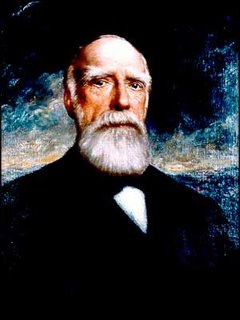Lord Strathcona... The Early Years

Donald Alexander Smith was a true "nineteenth century man" (MacDonald, Foreward). His life mirrors the developments of the era, he saw the world change from stagecoach to train, from sail boat transatlantic crossings to steam powered liners, and eventually, horses to automobiles. He saw the typewriter, the telephone and the telegram become a part of the business world. But perhaps most importantly, he saw Canada become a nation and played a significant role in its progress.
Donald Smith was born in 1820, in the town of Forres, on the northeast coast of Scotland. As a young boy it became apparent that Donald had a keen mind and an eagerness to learn. Though his parents hardly had the means to send Donald to school, they perservered because they believed in the importance giving their children a sound education. It was not long before Donald became one of the top scholars at the Forres Academy.
At this time, Scotland was experiencing an economic depression and crofters were being forced out of their homes by land owners into cities where they could not find employment. As a result, people were becoming Scotland's greatest export. As Canada was the destination of many of his kinsmen, Donald soon became fascinated with the stories of Canadian enterprises such as those going on in the Northwest Territories. His own uncles, Robert and John Smith, had joined the North West Company and become pioneers. John Smith explored the Fraser river with with Simon Fraser and John Quesnel in 1808, after having established Fort St. James . The lake nearby was named after John Stuart and a watercolour of it hung in the Smith household at Forres (Mac Donald, 20). It was probably a great source of inspiration for Donald as a young boy.
The notion of Donald leaving for Canada was not as inspiring for his parents, and with the help of John Smith, who knew the hardships of Canada's long winters, they convinced Donald to stay in Scotland and accept a position as a clerk. However Donald, in typical Scots persistence, would not give up the idea of Canada. In 1838, still uncertain to whether or not he wished to work for the Hudsons Bay Company, Donald Smith bought passage aboard the Royal William and set out for Canada (MacDonald, 25).
Soon after arriving in Canada, Donald did decide to look for a position within the Hudsons Bay Company. He started out as a clerk counting muskrat pelts, but soon rose through the ranks to become Chief Factor in Labrador (fur trader), and eventually Chief Commisioner for the Company in 1971. His strong work ethic and coolheaded determination was noticed by the Canadian government and in 1969, he was sent to negotiate a deal with Louis Riel, the metis leader of the Red River Rebellion. Through his courage and dogged persistence, the first uprising came to a peaceful resolution.
Donald's prolific career with the Hudsons Bay Company led to a number of other successes. As Chief Commisioner, Donald was able to help turn a series of isolated trading posts into a successful chain of stores. Later, he became a major player in the 'handing over of the Hudsons Bay territories to the Canadian government' (MacDonald,Foreward), and was one of the key figures in the creation of the Canadian Pacific Railway. In 1896, Donald was appointed High Commisioner: Canada's representative in the United Kingdom. In 1987, in London, England, it was decided that Donald Alexander Smith was to be raised into the peerage. Interestingly, it took him a long time to decide on the title by which he was to be known. After some deliberation he decided on 'Lord Strathcona and Mount Royal of Glencoe' (MacDonald, 416). Strathcona is a word created by the new baron; Strath' is Gealic for 'broad valley' and 'cona' is a reference to the River Coe, which flows through Glencoe to Loch Leven. Mount Royal is the mountain after which Montreal is named. Thus, he decided on a name that united the two countries he so greatly loved.
Lord Strathcona went on to use his incredible wealth and status to help build the nation he had a hand in creating. He helped establish the Royal Canadian Mounted Police and Canada's independant military. He contributed large donations to medical science and women's education, among many others; the following is just a small selection of the large record of donations the Donna MacDonald has accumulated in her biography of Lord Strathcona:
-1872 helped establish Manitoba College
- 1873 Ladies' School Winnipeg
-1879 towards Knox Church building fund Winnipeg
-1882 McGill University
-1884 Presbyterian College, Montreal
-1886 Royal Victoria Hospital construction and endowment
Works Cited:
MacDonald, Donna Lord Strathcona: A Biography of Donald Alexander Smith Dundurn Press, Toronto, Ontario, 1996.
Picture: Painting by Adolthus Muller-Ury in the Fine Arts Collection of The Hudsons Bay Co. Archives, Manitoba.

0 Comments:
Post a Comment
<< Home